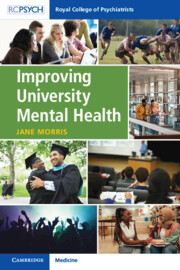Book contents
- Improving University Mental Health
- Improving University Mental Health
- Copyright page
- Contents
- Foreword
- Acknowledgements and Thanks to Contributors
- Chapter 1 Introducing This Handbook
- Chapter 2 Building a New Sense of Belonging
- Chapter 3 The Transition to University for New Students with Pre-Existing Mental Conditions
- Chapter 4 The Roles of Parents and Carers
- Chapter 5 Healthy Bodies, Body Image Concerns, Eating Disorders
- Chapter 6 Alcohol
- Chapter 7 Substance Misuse
- Chapter 8 Social (and Anti-social) Media
- Chapter 9 Finance and Mental Health
- Chapter 10 Neurodiversity
- Chapter 11 Ethnically Diverse University Communities
- Chapter 12 Sexual Behaviour and Gender Identity in Universities
- Chapter 13 The Mental Health of Teaching and Academic Staff
- Chapter 14 An Overview of Mental Disorders in Students and Staff
- Chapter 15 ‘Psychotic’ Disorders
- Chapter 16 Mood Disorders
- Chapter 17 Suicide at University
- Chapter 18 Mental Health Services on Campus and in the NHS
- Chapter 19 Students of the Professions and ‘Fitness to Practise’ Issues
- Chapter 20 Summing It All Up
- Index
- References
Chapter 10 - Neurodiversity
The Autistic Spectrum and Attention Deficit Hyperactivity Disorder
Published online by Cambridge University Press: 08 February 2024
- Improving University Mental Health
- Improving University Mental Health
- Copyright page
- Contents
- Foreword
- Acknowledgements and Thanks to Contributors
- Chapter 1 Introducing This Handbook
- Chapter 2 Building a New Sense of Belonging
- Chapter 3 The Transition to University for New Students with Pre-Existing Mental Conditions
- Chapter 4 The Roles of Parents and Carers
- Chapter 5 Healthy Bodies, Body Image Concerns, Eating Disorders
- Chapter 6 Alcohol
- Chapter 7 Substance Misuse
- Chapter 8 Social (and Anti-social) Media
- Chapter 9 Finance and Mental Health
- Chapter 10 Neurodiversity
- Chapter 11 Ethnically Diverse University Communities
- Chapter 12 Sexual Behaviour and Gender Identity in Universities
- Chapter 13 The Mental Health of Teaching and Academic Staff
- Chapter 14 An Overview of Mental Disorders in Students and Staff
- Chapter 15 ‘Psychotic’ Disorders
- Chapter 16 Mood Disorders
- Chapter 17 Suicide at University
- Chapter 18 Mental Health Services on Campus and in the NHS
- Chapter 19 Students of the Professions and ‘Fitness to Practise’ Issues
- Chapter 20 Summing It All Up
- Index
- References
Summary
Universities should recognise neurodiversity as conferring risk for mental health conditions and suicide. Evidence-based support and monitoring can reduce the risk of these occurring and can also reduce dropout and improve academic and psychosocial outcomes for these students and staff members. Staff training in recognition and management of neurodiverse conditions should be delivered at levels appropriate to staff roles. Despite growing interest in both ASD and ADHD in adults, many people who could benefit from diagnosis have not received it. Professionals need to be aware of underdiagnosis of both ASD and ADHD in girls and probably in ethnic and other minority groups. Lack of recognition deprives these vulnerable people of the supports universities can offer to people with neurodiversity. Lay people who take on caring or ‘buddying’ roles for people with neurodiversity need to be well-supported within a helping community rather than expected to shoulder responsibility alone. Waiting lists at many NHS clinics are too long to provide timely assessment for students. University mental health staff may be able to create recognised training programmes and negotiate agreements about diagnosis and prescribing with local GPs.
Keywords
- Type
- Chapter
- Information
- Improving University Mental Health , pp. 136 - 159Publisher: Cambridge University PressPrint publication year: 2024

